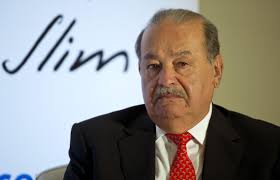
Billionaire Carlos Slim’s America Movil said on Tuesday it is ready to divest assets in an unprecedented step to cut its market share in Mexican telecoms below 50 percent and escape the burden of tougher regulations.
The company, which controls some 70 percent of Mexico’s mobile market and 80 percent of the fixed line business, said in a statement its board had decided to sell assets to another company that could boost investment in the sector.
America Movil, Latin America’s biggest telecoms company, did not specify which assets it could get rid of, and a spokesman said it was still open as to what and to whom it could sell.
But America Movil said the buyer needed to be “an option that can genuinely take part in this capital-intensive sector, to overcome the insufficient investment of our competitors.”
The Mexican government hailed the decision, saying it was a direct result of its drive to improve competition.
“The Transport and Communications Ministry declares that this decision could transform competition in the telecommunications sector with improved quality and better prices for services to end users,” the ministry said in a statement.
Still, any divestitures would be “conditional” on America Movil’s mobile phone and fixed-line units no longer being declared dominant players, the company said. That could still create a potential conflict with Mexico’s telecoms regulator.
Reducing Slim’s market share below 50 percent would be a triumph for President Enrique Pena Nieto, who took office 20 months ago pledging to boost competition in Latin America’s no. 2 economy, where massive wealth is concentrated in few hands.
Slim is already under pressure to share his infrastructure with competitors such as Spain’s Telefonica, and the sale could allow him to enter into lucrative markets he has so far been kept out of, like pay TV.
“They’re selling what they would have had to share anyway,” said Jose Otero, president of Signals Telecom Consulting.
America Movil also said in its statement it would renounce its option to buy a majority stake in satellite television company Dish Mexico, with whom it has a billing arrangement that competitors say violates its exclusion from TV.
Still, the company, which had revenues of 786 billion Mexican pesos ($60.54 billion) last year, added it expected to be allowed to offer all telecommunications services, which include pay TV, in return for going ahead with divestitures.
EFFECTIVE COMPETITION
To escape the antitrust measures applied to dominant players by new watchdog Federal Institute of Telecommunications (IFT), America Movil must present its plan to the regulator.
According to new regulations under debate in Congress that will govern a sweeping telecoms and broadcasting reform passed last year, the IFT would only free America Movil from tougher regulation once “effective competition conditions” exist.
Reducing America Movil’s number of users below 50 percent would be complex and could even have negative repercussions on consumers in the short term, said Enrique Melrose, a former commissioner of Mexico’s previous telecoms watchdog, Cofetel.
America Movil announced its plan just as the lower house of Congress was giving general approval to those so-called secondary laws for Pena Nieto’s telecoms reform, which gives the IFT the power to break up dominant players if necessary.
The reform, which also targets Mexico’s dominant broadcaster Televisa, has loomed over Slim’s businesses since Pena Nieto first presented it on March 11. Still, shares in America Movil are up 2.4 percent since then.
Under it, Slim’s companies are being forced to slash costs they charge other companies to complete calls on their network along with a series of other restrictive measures.
The measures are the toughest battery of regulations Slim has faced since he took control of Mexico’s former state phone monopoly at the start of the 1990s. The company, known as Telmex, helped to make him the world’s richest man by 2010.
America Movil, which had 105 million mobile subscribers in the first quarter of this year, also said it was prepared to separate its cellphone towers and other infrastructure. However, it did not detail how it could do so.
Economic Times

Leave a Reply
You must be logged in to post a comment.